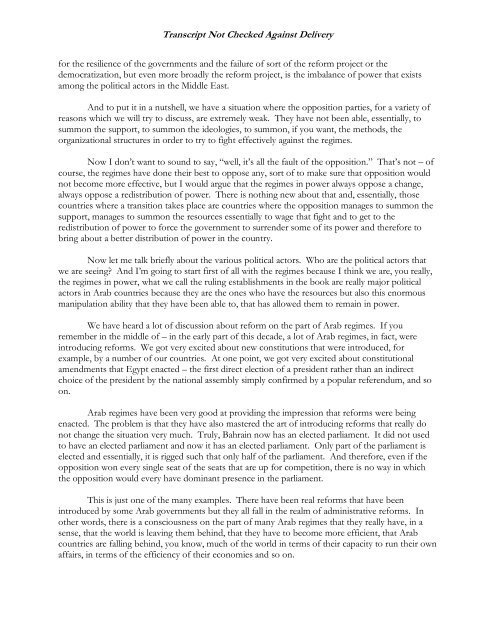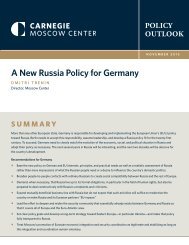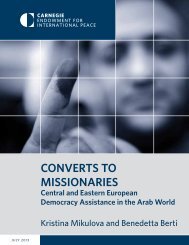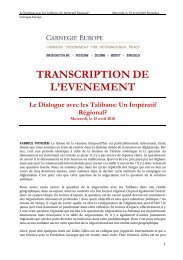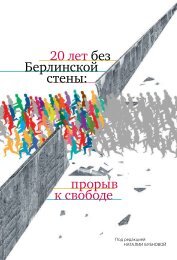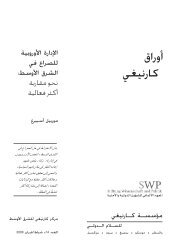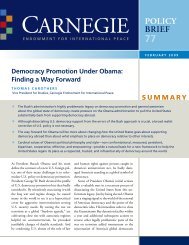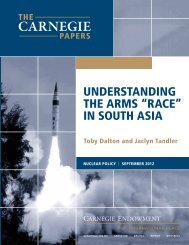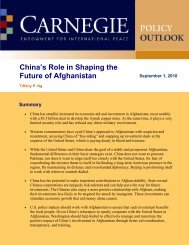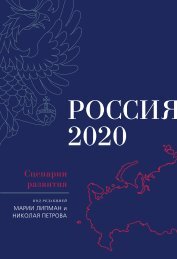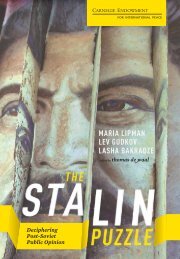getting to pluralism: political actors in the arab world - Carnegie ...
getting to pluralism: political actors in the arab world - Carnegie ...
getting to pluralism: political actors in the arab world - Carnegie ...
You also want an ePaper? Increase the reach of your titles
YUMPU automatically turns print PDFs into web optimized ePapers that Google loves.
Transcript Not Checked Aga<strong>in</strong>st Delivery<br />
for <strong>the</strong> resilience of <strong>the</strong> governments and <strong>the</strong> failure of sort of <strong>the</strong> reform project or <strong>the</strong><br />
democratization, but even more broadly <strong>the</strong> reform project, is <strong>the</strong> imbalance of power that exists<br />
among <strong>the</strong> <strong>political</strong> ac<strong>to</strong>rs <strong>in</strong> <strong>the</strong> Middle East.<br />
And <strong>to</strong> put it <strong>in</strong> a nutshell, we have a situation where <strong>the</strong> opposition parties, for a variety of<br />
reasons which we will try <strong>to</strong> discuss, are extremely weak. They have not been able, essentially, <strong>to</strong><br />
summon <strong>the</strong> support, <strong>to</strong> summon <strong>the</strong> ideologies, <strong>to</strong> summon, if you want, <strong>the</strong> methods, <strong>the</strong><br />
organizational structures <strong>in</strong> order <strong>to</strong> try <strong>to</strong> fight effectively aga<strong>in</strong>st <strong>the</strong> regimes.<br />
Now I don’t want <strong>to</strong> sound <strong>to</strong> say, “well, it’s all <strong>the</strong> fault of <strong>the</strong> opposition.” That’s not – of<br />
course, <strong>the</strong> regimes have done <strong>the</strong>ir best <strong>to</strong> oppose any, sort of <strong>to</strong> make sure that opposition would<br />
not become more effective, but I would argue that <strong>the</strong> regimes <strong>in</strong> power always oppose a change,<br />
always oppose a redistribution of power. There is noth<strong>in</strong>g new about that and, essentially, those<br />
countries where a transition takes place are countries where <strong>the</strong> opposition manages <strong>to</strong> summon <strong>the</strong><br />
support, manages <strong>to</strong> summon <strong>the</strong> resources essentially <strong>to</strong> wage that fight and <strong>to</strong> get <strong>to</strong> <strong>the</strong><br />
redistribution of power <strong>to</strong> force <strong>the</strong> government <strong>to</strong> surrender some of its power and <strong>the</strong>refore <strong>to</strong><br />
br<strong>in</strong>g about a better distribution of power <strong>in</strong> <strong>the</strong> country.<br />
Now let me talk briefly about <strong>the</strong> various <strong>political</strong> ac<strong>to</strong>rs. Who are <strong>the</strong> <strong>political</strong> ac<strong>to</strong>rs that<br />
we are see<strong>in</strong>g? And I’m go<strong>in</strong>g <strong>to</strong> start first of all with <strong>the</strong> regimes because I th<strong>in</strong>k we are, you really,<br />
<strong>the</strong> regimes <strong>in</strong> power, what we call <strong>the</strong> rul<strong>in</strong>g establishments <strong>in</strong> <strong>the</strong> book are really major <strong>political</strong><br />
ac<strong>to</strong>rs <strong>in</strong> Arab countries because <strong>the</strong>y are <strong>the</strong> ones who have <strong>the</strong> resources but also this enormous<br />
manipulation ability that <strong>the</strong>y have been able <strong>to</strong>, that has allowed <strong>the</strong>m <strong>to</strong> rema<strong>in</strong> <strong>in</strong> power.<br />
We have heard a lot of discussion about reform on <strong>the</strong> part of Arab regimes. If you<br />
remember <strong>in</strong> <strong>the</strong> middle of – <strong>in</strong> <strong>the</strong> early part of this decade, a lot of Arab regimes, <strong>in</strong> fact, were<br />
<strong>in</strong>troduc<strong>in</strong>g reforms. We got very excited about new constitutions that were <strong>in</strong>troduced, for<br />
example, by a number of our countries. At one po<strong>in</strong>t, we got very excited about constitutional<br />
amendments that Egypt enacted – <strong>the</strong> first direct election of a president ra<strong>the</strong>r than an <strong>in</strong>direct<br />
choice of <strong>the</strong> president by <strong>the</strong> national assembly simply confirmed by a popular referendum, and so<br />
on.<br />
Arab regimes have been very good at provid<strong>in</strong>g <strong>the</strong> impression that reforms were be<strong>in</strong>g<br />
enacted. The problem is that <strong>the</strong>y have also mastered <strong>the</strong> art of <strong>in</strong>troduc<strong>in</strong>g reforms that really do<br />
not change <strong>the</strong> situation very much. Truly, Bahra<strong>in</strong> now has an elected parliament. It did not used<br />
<strong>to</strong> have an elected parliament and now it has an elected parliament. Only part of <strong>the</strong> parliament is<br />
elected and essentially, it is rigged such that only half of <strong>the</strong> parliament. And <strong>the</strong>refore, even if <strong>the</strong><br />
opposition won every s<strong>in</strong>gle seat of <strong>the</strong> seats that are up for competition, <strong>the</strong>re is no way <strong>in</strong> which<br />
<strong>the</strong> opposition would every have dom<strong>in</strong>ant presence <strong>in</strong> <strong>the</strong> parliament.<br />
This is just one of <strong>the</strong> many examples. There have been real reforms that have been<br />
<strong>in</strong>troduced by some Arab governments but <strong>the</strong>y all fall <strong>in</strong> <strong>the</strong> realm of adm<strong>in</strong>istrative reforms. In<br />
o<strong>the</strong>r words, <strong>the</strong>re is a consciousness on <strong>the</strong> part of many Arab regimes that <strong>the</strong>y really have, <strong>in</strong> a<br />
sense, that <strong>the</strong> <strong>world</strong> is leav<strong>in</strong>g <strong>the</strong>m beh<strong>in</strong>d, that <strong>the</strong>y have <strong>to</strong> become more efficient, that Arab<br />
countries are fall<strong>in</strong>g beh<strong>in</strong>d, you know, much of <strong>the</strong> <strong>world</strong> <strong>in</strong> terms of <strong>the</strong>ir capacity <strong>to</strong> run <strong>the</strong>ir own<br />
affairs, <strong>in</strong> terms of <strong>the</strong> efficiency of <strong>the</strong>ir economies and so on.


